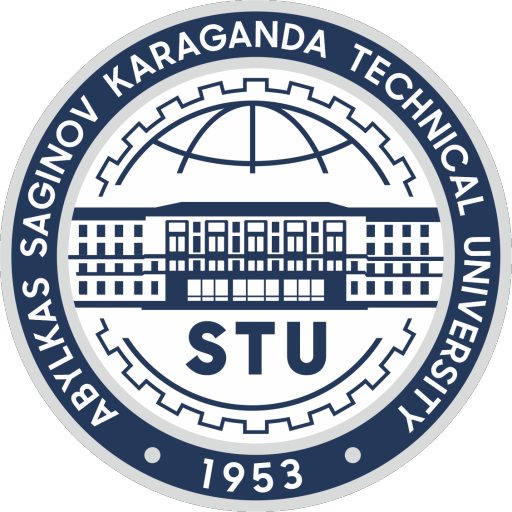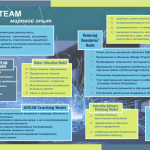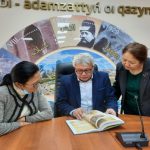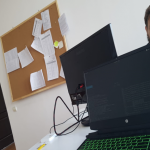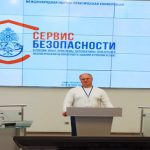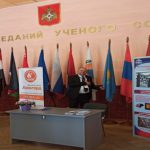AP09260338 “Developing the potential of innovative training of engineers through STEAM education”, p.m. Jantassova D.D.
Relevance
The object of the study is the higher education system with the focus on improving the quality of education through the integration of scientific, technical and art directions in educational programs through the creative component in the field of maintaining creativity and innovative skills. The project explored the process of preparing technical students, STEAM learning technologies, educational and methodological documents and learning outcomes that influence indicators of academic performance and quality of education, taking into account the formation of a specialist with innovative thinking, communication cooperation skills, and also the ability to make creative decisions in professional activities. The analysis of the effectiveness of the phased implementation of the model of training specialists methods through STEAM education was carried out with defining the functions of the educational process subjects at the implementation stage within the framework of pilot educational programs. The implementation of technology was monitored taking into account risks, the research results were analyzed and developed.
The project purpose
Developing and implementing of the training technical specialists model through STEAM technologies for the implementation of sustainable training programs in intercultural communication, creative industry and creative cooperation based on creativity and intellectual capital. Assessing the needs of the STEAM education potential, developing and implementing measures to develop the potential of training programs in technical specialties based on the development of specialized competencies that allow strengthening qualifications and abilities of students and teachers at the international level.
Expected and achieved results
– educational programs for training technical specialists and mechanisms for interaction between all the subjects of the educational process have been developed;
– the analysis of the effectiveness of the phased implementation of the model of training specialists methods through STEAM education was carried out with defining the functions of the educational process subjects at the implementation stage within the framework of pilot educational programs;
– monitoring the technology implementation taking into account risks have been carried out, research results have been analyzed;
– based on the results of the analysis of the research results, final recommendations have been prepared for organizing the main processes of the University based on the STEAM methodology;
– a final list of recommendations on communication and cooperation dialogue has been prepared.
There were published 2 articles in journals recommended by the SCOPUS, a chapter in a foreign publisher and a monograph, as well as a certificate of intellectual property (CIP).
List of publications
- Jantassova, D., Churchill, D., Shebalina, O., Akhmetova, D. Capacity Building for Engineering Training and Technology via STEAM Education // Education Sciences (MDPI). 2022 – 12(11) – 737. DOI: 10.3390/educsci12110737 (Scopus – Q1)
- D. Jantassova, Andrew David Hockley, O. Shebalina, D. Akhmetova. Evaluation of Communication and Collaboration Processes for Creating an Integrative STEAM Space at the Saginov Technical University. TEM Journal. Volume 12, Issue 1, pp. 470-481, 2023. DOI:10.18421/TEM121-57 (Scopus – Q2).
- D. Jantassova, O. Shebalina, D. Akhmetova. Capacity Building for Training Technical Specialists through STEAM Education: A Review of the Research. – BP International, 2023. Vol.4 Research Highlights in Language, Literature and Education, ch. 5: pp. 58-99. Ссылка https://stm.bookpi.org/RHLLE-V4/article/view/10162
- Jantassova D.D. Innovative training of engineers through STEAM education: monograph. – Almaty: Smart University Press, 2022. 204 p. ISSN 2518-1793
- Certificate of entry of information into the state register of rights to objects protected by copyright D.D. Jantassova, O. A. Shebalina, D. R. Akhmatova. “Model of developing the potential of training technical specialists through STEAM education” as a scientific work” No. 33292 dated February 28, 2023
Research team
- Jantassova Damira Dulatovna, project manager, Candidate of Pedagogical Science, head of the Foreign Languages Department, KTU
ORCID ID: 0000-0003-2595-3249
Researcher ID P-7271-2017
Scopus Author ID 57189027014
- Akhmetova Dinara Rashidovna, researcher, MPS, senior lecturer of the Department of Foreign Languages Department, KTU
ORCHID 0000-0003-2149-3353
Scopus Author ID 57211773480
- Shebalina Olga Andreyevna, researcher, MPS, doctoral student of Gumilyov ENU in “Sociology”.
ORCID 0000-0001-7641-2528Scopus Author ID: 57207845776
- Damiyev Daniel Temirgaliyevich, researcher, Master of Technical Sciences
ORCID ID 0000-0002-4245-6810
- Kalinin Alexey Anatolyevich, researcher, PhD, head of the Information and Computing Systems Department
ORCHID 0000-0003-4699-7240
Scopus Author ID 57193550259
- Yurchenko Vassily Viktorovich, researcher, PhD, head of the Technological Equipment, Mechanical Engineering and Standardization Department, KTU
ORCHID 0000-0002-6543-1632
Scopus Author ID 57213756780
- Vavilova Oksana Nikolaevna, researcher, senior lecturer at the Architecture and Design Department, KTU
ORCID 0000-0003-4449-5087
- Tentekbayeva Zhuldyz Mukhamedgaliyevna, researcher, MPS, senior lecturer of the Foreign Languages Department
Information for potential consumers
The potential development model for training technical specialists through STEAM education has been introduced to implement sustainable training programs based on creativity and intellectual capital.
There is a possibility of commercializing the technology of training technical specialists through STEAM education. The results of scientific research can be used in the practice of technical universities in Kazakhstan as methodological recommendations for developing the potential of training engineers, developing STEAM education as the key factor in the creative industry.
The advantage of the project is the developed model for developing the potential of technical personnel innovative training through STEAM education aimed at building a sustainable and promising curriculum for training technical personnel based on stimulating and developing the creative culture of engineers. The innovation of the project is the developed modular program of the course “Training engineers for the creative industry” and training technology with the definition of tools for supporting and coordinating training for designing the STEAM educational environment at a technical university.
АР09261117 Development of web-textbooks for levels B1, B2 «Qazaq tili» using innovative technologies (for training in higher educational institutions) Scientific supervisor –Nygmetova N.T.
Relevance
In the state program by implementation of the country’s language policy for 2020-2025, ensuring the functioning of the кazakh language as the state language, modernizing the кazakh language based on the latin alphabet is one of the main goals. This determines the relevance of the project.
Objective of the project
The goal of the project is to support the transition to the latin alphabet and demonstrate the effectiveness of using innovative technologies in teaching the kazakh language.
Main results of the scientific research:
- Website created https://q-uirenu.kz for levels B1, B2 in the subject «Kazakh language».
- The web textbook «Qazaq tili» was developed and put into operation.
- A test module with results for the web textbook platform has been developed.
- A Web platform for teaching the kazakh language has been developed.
Based on the results of the research, 1 article was published in a scientific publication approved by the «Committee for quality assurance in the field of science and higher education of the Ministry of science and higher education of the Republic of Kazakhstan. Published 1 report at an international scientific conference.
1 certificate of entry of information into the state register of rights to objects protected by copyright has been received.
Research group
- Nygmetova Nurgul Tursynovna, PhD., e.d. Associate professor of the department of «Kazakh language and culture».
ORCID 0000-0002-6421-8231
Scopus Author ID 56127513100
- Zhetpisbai Sholpan Akhanovna – MPs., senior lecturer at the department of «Kazakh language and culture».
Scopus Author ID 56178067800
- Tursyn Abylay Oralovich. MEs., programmer.
- Derkach Sergei. Freelancer, designer.
Information for potential users
«Qazaq tili» web textbooks for language levels B1, B2 can be followed and used in higher education institutions and vocational education institutions
AP09259869 “Developing methods of assessing occupational safety based on multifactor analysis and modeling at chemically hazardous facilities in Kazakhstan”, project manager Yemelin P.V.
Relevance
Implementation of the project results will reduce the level of accidents, industrial injuries and occupational diseases of personnel at chemically hazardous facilities of enterprises of the Republic of Kazakhstan.
The structure of the developed methodological approach allows integrating it into the standard process of a systemic comprehensive assessment of the state of the industrial safety system level at the enterprise.
The introduction of the results of research work into the activities of government bodies that supervise and regulate in the field of labor protection and industrial safety, as well as specialized services of industrial enterprises with chemical waste will allow identifying and carrying out a set of measures aimed at predicting and reducing the likelihood of man-made emergencies.
The results of the research conducted within the framework of this work can be used in the development of a regulatory framework in terms of improving occupational safety in enterprises with chemical waste products, and can also be considered for implementation as an integral part of one of the monitoring subsystems of the Unified State Monitoring System (USMS), included in the State Program “Digital Kazakhstan”.
The project purpose
The purpose of the project is to develop scientifically based methods of assessing occupational safety and reducing the risks of accidents at chemical enterprises, industrial injuries and occupational diseases of workers at chemically hazardous facilities of enterprises of the Republic of Kazakhstan.
Expected and achieved results
When implementing the research work, a methodological approach was developed for analyzing and assessing the risk of accidents, industrial injuries and occupational diseases of personnel at chemical enterprises of enterprises of the Republic. To develop it, a comprehensive analysis of the international and national legislative framework, and research in the field of industrial safety and labor protection, data on emergencies that occurred at chemically hazardous facilities and their consequences was carried out.
Based on the developed “Methods of analyzing and assessing the risk of accidents, occupational injuries and occupational diseases of personnel at chemically hazardous facilities of enterprises of the Republic of Kazakhstan”, an “Information and analytical system for monitoring and assessing the risk of accidents, occupational diseases and occupational injuries at enterprises with chemical organizations of the Republic of Kazakhstan” was developed. The manual “Information and analytical system for monitoring and assessing the risk of accidents, occupational diseases and occupational injuries at enterprises with chemical enterprises of the Republic of Kazakhstan” provides a detailed description of the purpose of the system, the goals set for it and the tasks to be solved, as well as a list of its potential users. The internal modular structure of the “Information and analytical system for monitoring and assessing the risk of accidents, occupational diseases and industrial injuries at enterprises with chemical enterprises of the Republic of Kazakhstan” is presented with a detailed description of the functionality of each module (service modules, main modules, auxiliary modules). The user manual is described in detail that allows carrying out step-by-step all the necessary operations from automated input of the entire required set of initial data, carrying out calculations, viewing service information and the obtained calculation results, generating output forms of a summary report for further carrying out an objective comprehensive analysis and assessing the health status of the industrial safety management system risk of an industrial enterprise with chemically hazardous facilities.
The methodological approach and information and analytical system were suCCHESsfully tested at industrial enterprises with chemically hazardous facilities located on the territory of the Republic of Kazakhstan. The “Guidelines for monitoring, assessing the risk of accidents, occupational diseases and industrial injuries, and establishing the class of accident hazard, harmfulness and injury hazard at chemical enterprises of enterprises of the Republic of Kazakhstan” developed by the research group describes an algorithm for assessing the risk of accidents, occupational diseases and industrial injuries at chemically hazardous facilities, including the use of it contains an information and analytical system.
In addition to the risk assessment process, this guide provides recommendations for carrying out activities aimed at the safe operation of chemically hazardous facilities.
The “Information and analytical system for monitoring and assessing the risk of accidents, occupational diseases and industrial injuries at enterprises with chemical enterprises of the Republic of Kazakhstan” has been tested and approved at industrial enterprises with chemically hazardous facilities in Central and Southern Kazakhstan. Figures (1-4) show forms of working with the software product as an example.
Implementation of the “Information and analytical system for monitoring and assessing the risk of accidents, occupational diseases and industrial injuries at enterprises with chemical enterprises of the Republic of Kazakhstan” will permit:
– for controlling and supervisory organizations to determine quickly a set of measures aimed at reducing the impact of damaging emergency factors, receive reliable information about the current and expected state of chemical waste, and promote more effective regulation and state control;
– to provide local executive authorities with reliable information of the current and expected state of labor safety at potentially hazardous sites in order to make timely decisions on measures to improve it;
– for the enterprise management to increase the efficiency of occupational risk management, conduct a comprehensive analysis and assessment of the risk of accidents, industrial injuries and occupational diseases of personnel, calculate and predict quantitative characteristics of the safety state that can be controlled at specific technological facilities or processes, which in turn will reduce economic costs, related to the elimination of damage to the production environment and the labor process;
– to improve the occupational risk management system at chemically hazardous facilities of industrial enterprises of the Republic of Kazakhstan.
The developed software product can be a subsystem of the unified Corporate information and communication system “Computer system for monitoring hazard classes of industrial enterprises of the Republic of Kazakhstan”.
In 2023, members of the research group took part in the International Scientific and Practical Conference “Security Service in Russia: Problem Experience, Prospects. Fire and environmental safety of buildings in Russia and the EAEU.”
Research team
- Yemelin Pavel Vladimirovich, project manager, Doctor of Engineering, Deputy Director for science and innovation of NAKS GAC LLP. ORCID ID 0000-0001-7431-0069. Author ID in Scopus 57194898487. Researcher ID Web of Science AAZ-5032-2020.
- Kudryavtsev Sergey Sergeyevich, responsible officer, Candidate of Biological Science, Associate Professor of the Chemistry and Chemical Technology Department of Abylkas Saginov KTU. ORCID ID 0000-0002-7232-6304. Author ID in Scopus 57194898408. Researcher ID Web of Science AAA-6935-2020.
- Amirov Azamat Zhanbulatovich, PhD, Director of the Children’s Educational Institution of Abylkas Saginov KTU. ORCID ID 0000-0002-5895-7185.
- Derbush Svetlana Nikolaevna, Candidate of Biological Science, Associate Professor of the Chemistry and Chemical Technology Department of Abylkas Saginov KTU. ORCID ID 0000-0003-4520-1546.
- Rakhimberlina Aigerim Amantaevna, MTS, teacher of the RA&OS Department of Abylkas Saginov KTU. ORCID ID 0000-0002-5310-5944
- Yemelina Natalya Konstantinovna, PhD, Associate Professor of the Higher Mathematics Department of Kazpotrebsoyuz KU. ORCID ID 0000-0002-0215-7525. Author ID in Scopus 5719487103657194871036. Researcher ID Web of Science AAT-1281-2020
- Kozhanov Murat Galiaskarovich, PhD, Head of the IT Project Development Department of Abylkas Saginov KTU.
List of publications:
- 1. Yemelin Pavel, Yemelina Natalya, Kudryavtsev Sergey, Rakhimberlina Aigerim. Application of Quantitative Analysis to Develop a Methodological Approach to the Analysis and Assessment of the Risk of Accidents at Industrial Enterprises with Chemically Hazardous Sites. University Proceedings, No.(90). 2023. P. 132 – 137.
- Kudryavtsev S.S., Yemelin P.V., Rakhimberlina A.A. Analyzing methods of assessing and managing risks at hazardous production facilities. Proceedings of the University, Karaganda: Abylkas Saginov KTU, 2023, No. 3 (92), pp. 145 – 150.
- Certificate of State registration of rights to the object of copyright of the Republic of Kazakhstan (“Methodology for analyzing and assessing the risk of accidents, industrial injuries and occupational diseases of personnel at chemically hazardous facilities of enterprises of the Republic of Kazakhstan”).
Information for potential consumers
The results of the project will allow the industrial enterprise to develop a set of measures aimed at preventing chemical accidents and reducing the consequences if they occur.
Implementation of the “Information and analytical system for monitoring and assessing the risk of accidents, occupational diseases and industrial injuries at enterprises with chemical enterprises of the Republic of Kazakhstan” will permit:
– for controlling and supervisory organizations to determine quickly a set of measures aimed at reducing the impact of damaging emergency factors, receive reliable information about the current and expected state of chemical waste, and promote more effective regulation and state control;
– to provide local executive authorities with reliable information of the current and expected state of labor safety at potentially hazardous sites in order to make timely decisions on measures to improve it;
– for the enterprise management to increase the efficiency of occupational risk management, conduct a comprehensive analysis and assessment of the risk of accidents, industrial injuries and occupational diseases of personnel, calculate and predict quantitative characteristics of the safety state that can be controlled at specific technological facilities or processes, which in turn will reduce economic costs, related to the elimination of damage to the production environment and the labor process.
Scope
The development of the concept of chemical safety in the Republic of Kazakhstan is seen by the research group in the study of the impact of dangerous and harmful factors of the working environment on professional health and the risks associated with them, as well as the study of the risks of certain types of accidents that can occur in technological processes, operation of equipment and used in the production process that can become very relevant topics for subsequent scientific research. The development of a unified information and analytical system that combines the assessment of the risks of accidents, occupational diseases and industrial injuries, and the establishment of the class of accident hazard, harmfulness and injury hazard at chemical enterprises of enterprises of the Republic of Kazakhstan, will allow carrying out more effective and coordinated preventive and protective measures for government bodies in the field of emergency prevention, industrial safety and labor protection.
